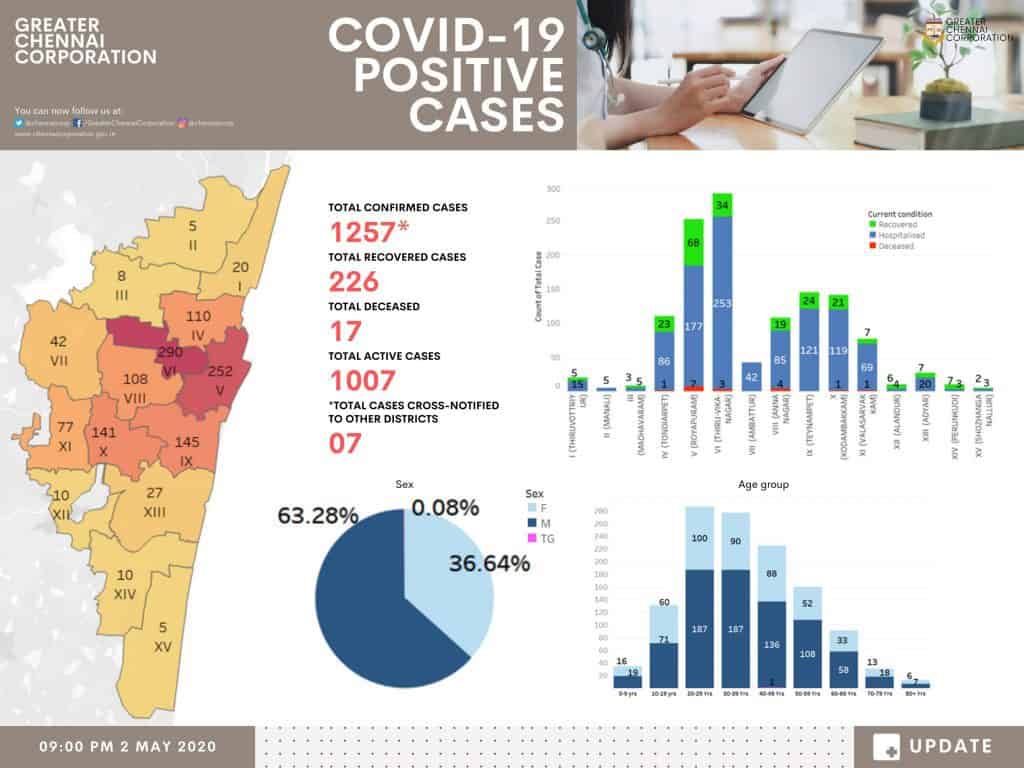COVID-19: Chennai Corporation gets new nodal officer; door-to-door sanitation in six zones; ATMs to be disinfected after every use
In a recent move in the COVID battle, the state government has appointed senior bureaucrat and Commissioner of Revenue Administration J Radhakrishnan as the Special Nodal Officer for Chennai Corporation for coordinating COVID-19 related activities. He will be supported by a team of five IPS officers — Mahesh Kumar Agarwal, Abhash Kumar, Amaresh Pujari, Abhay Kumar Singh and K Bhavaneeswari.
On the evening of May 2nd, Chennai recorded 174 COVID-positive patients, taking the total number of cases to 1257, according to Tamil Nadu Health Department’s bulletin. In the city, 226 patients have recovered from the disease, 17 have died and the total number of active cases amount to 1007 as on May 2.
Alarmed by the total count, the Greater Chennai Corporation (GCC) has identified six zones in Chennai where officials will make door-to-door visits in the zones to sanitise the surroundings of these residences. Officials state that the alleys in Royapuram and Thiru Ve Ka Nagar have been turned into hotspots. GCC Commissioner G Prakash stated that over 90% of people who tested positive are asymptomatic and the source of infection for more than 44 cases is yet to be identified.

As cases have been increasing with every passing day, resident welfare associations are quarantining their streets by erecting banners and signboards at the entry points, asking outsiders not to enter the streets. MGR Nagar in Thirumullaivoyal, Rettakuzha lane in Mylapore and Perumbakkam Tamil Nadu Slum Clearance Board (TNSCB) tenements are a few of the places where neighbourhood residents have closed entry.
In yet another move, GCC has ordered that all ATMs need to be disinfected after every use. The civic body further stated that government offices and private establishments allowed to function under essential services category during the lockdown must disinfect twice a day, abide by social distancing norms and ensure frequent handwashing by staff present. It also ordered that exclusive personnel should be appointed for disinfection. Violation of norms would lead to sealing of these offices.
Entry of the public to the Koyambedu Wholesale Market Complex has been banned by the Chennai Metropolitan Development Area (CMDA). Further, the officials have imposed a blanket ban on retail shops functioning as they violate distancing norms. A press release from CMDA stated that retail traders selling flowers and fruits will operate from the Madhavaram mofussil bus terminus.
GCC has begun distributing siddha and ayurveda medicines (nilavembu kudineer and kabasuram kudineer) to its workers and quarantined residents. It is stated that drinking the concoction will help boost immunity.
Source: News 18, The Hindu, NDTV, The Times of India, The New Indian Express
Reservoir and groundwater levels improve
Last week’s sporadic showers brought further assurance with respect to Chennai’s water situation. The Poondi reservoir in Tiruvallur district had an inflow at the rate of 200 cusecs (cubic feet per second).
Among the four reservoirs, the storage in Red Hills (total capacity: 3,300 mcft) reservoir touched 2,958 mcft and Poondi reservoir storage (total capacity: 3,231 mcft) stood at 910 mcft. Officials from Chennai Metropolitan Water Supply and Sewerage Board (CMWSSB) stated that with the available water in the reservoirs, piped water supply could be sustained for the next six months without any hitch.
Experts state that groundwater level has improved in several localities including Nanganallur, Chrompet, Tambaram and Meenambakkam. CMWSSB board officials point to restoration of water bodies as the primary reason for the improved groundwater levels. The officials also add that the demand for water tankers has come down this year.
Source: The Times of India
Demolition of Elephant Gate bridge begins
The Elephant Gate bridge between Central and Basin Bridge Junction has been divided into several blocks and the demolition is under way. Each block will be razed with the help of bridge breaking machines. Officials of Southern Railways state that the destruction work will be carried without train traffic hindrance.
It may be noted that a bridge at an estimated cost of Rs 30.32 crore was planned to be built by the Southern Railways and Greater Chennai Corporation. However, there was a delay in replacing the high voltage power lines passing through the bridge by the Tamil Nadu Transmission Corporation Limited (TANTRANSCO). The department blamed the procedural delay in acquiring land for shifting the lines.
During inspection, it was found that the bridge had developed cracks a few years ago. According to the railway board safety norms, a distance of 2.36 should be maintained between the centre of track and permanent structure. However, the distance between pillars of the bridge is 2.28m.
Source: The New Indian Express
DPR preparation underway for three smart city projects
While GCC is battling COVID-19, Chennai Smart City officials have completed the paperwork for the mega streets project, the CITES project and the intelligent transport system. The consultants of the project are preparing a detailed project report (DPR). Officials state that the project will be kicked off once the lockdown is lifted.
The mega streets project will begin first; the project aims to transform 686km of city roads by widening footpaths, ducting of utilities to prevent road cuts for 30 years, parking plans in neighbourhoods and augmenting livability in Chennai.
Source: The Times of India
Compiled by Bhavani Prabhakar